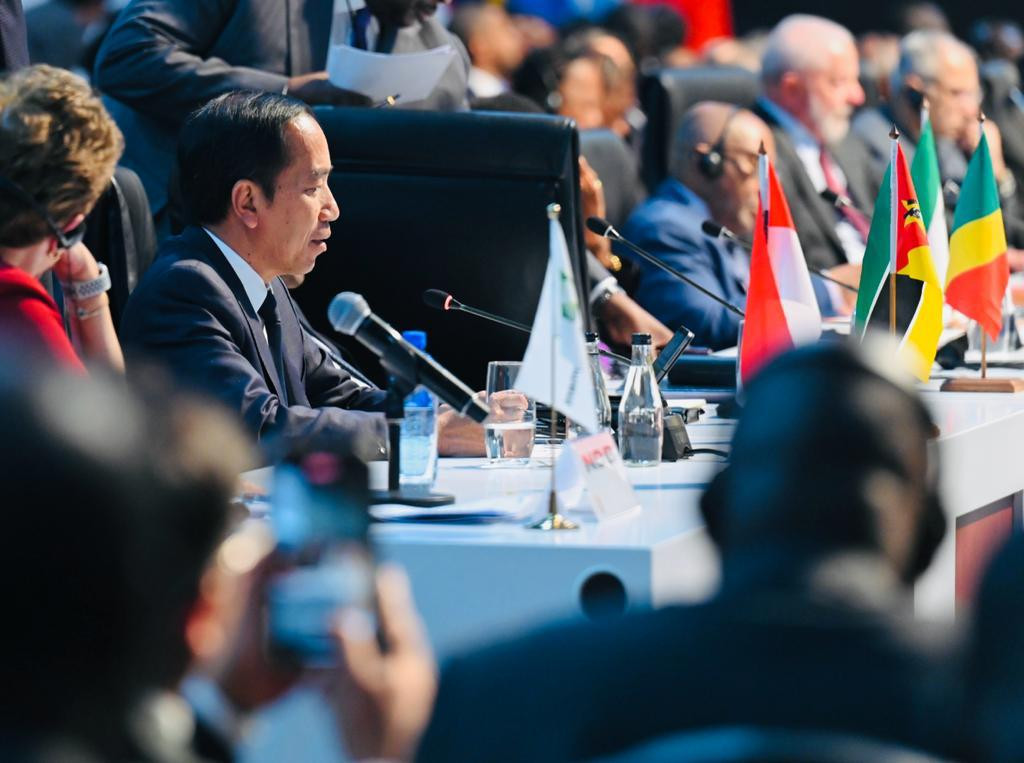Popular Reads
Top Results
Can't find what you're looking for?
View all search resultsPopular Reads
Top Results
Can't find what you're looking for?
View all search resultsBeyond great power rivalry
BRICS has yet to prove its mettle in advancing a more equal and just economic order and mutually beneficial partnership for the Global South.
Change text size
Gift Premium Articles
to Anyone
D
espite the presence of President Joko “Jokowi” Widodo at the recent BRICS Summit in Johannesburg, South Africa, Indonesia made a wise decision by not applying for membership of the bloc of emerging countries, which offers the largest market in the world.
Although membership may boost relations with thriving economies across all continents, it may not be timely amid the intensifying great power rivalry, as evident in the United States’ growing hostility toward China, the Asian superpower.
BRICS was coined by Goldman Sachs chief economist Jim O'Neill who sought a term for analyzing a group of emerging markets, Brazil, Russia, India, China and South Africa, whose strong economic growth was predicted to dominate the world economy by 2050.
In its development, the bloc has portrayed itself as a champion of Global South countries, many of which feel that they have been unfairly treated in the Western-dominated international trade order and economic partnership with the West.
The geopolitical shifts caused by the Russia-Ukraine war and the US-China rivalry, however, have put the bloc in an odd position that makes it no longer an advocate of emerging economies, but free riders that aim to benefit from global fractures.
When Russia invaded Ukraine last year, the bloc refrained from condemning Russia and in a move seen as circumventing the West, the countries profited from cheap oil that Russia desperately sold amid Western sanctions. Indonesia condemned the invasion and has called for a peaceful resolution to the war.
As each country member of BRICS has different views toward the US and its own interests in joining the group, the trade bloc’s influence has yet to be made clear. Nonetheless, six new countries have decided to join it, beginning in 2024.
While Russia may be eager to form an anti-West club, China, which accounts for 70 percent of the bloc’s current economy, is cautiously calibrating its relations with the US while remaining friendly to Russia.
India is contesting China's dominance in Asia and the Pacific and has developed a better relationship with the US. India is part of the Quad, a security forum that also consists of the US, Japan and Australia and aims at containing China.
Meanwhile, Brazil is a US partner but has continued to buy oil from Russia. South Africa has the least complicated relations with the US, China, and even Russia, while generally still benefiting from relations with the big powers.
Facing trade disputes with the European Union over mineral ores and palm oil, Indonesia may find itself in the same boat with Global South countries. Indonesia has also borne the brunt of the US Federal Reserves’ interest rate aggression, which has made the US dollar unattainable by other currencies.
There is an inherent need for Indonesia to join groups based on mutual interests and equal footing, which BRICS may offer. But with the increasingly tight global competition, BRICS has yet to prove its mettle in advancing a more equal and just economic order and mutually beneficial partnership for the Global South. In fact, it is still struggling to find common ground amid the differing political views of the members.
One of the interesting items on BRICS’ agenda that Indonesia can look into is the group’s bid to bolster local currencies to strengthen their native economies, which is widely known as de-dollarization. During the recent summit, BRICS discussed the usage of local currencies for cross-border transactions.
It remains to be seen how far BRICS can push the multilateral efforts to end the US dollar’s predominance, but Indonesia has been advocating local currency settlement in ASEAN since 2018 and as this year’s ASEAN chair is stepping this up to a new level.
At the end of the day Indonesia should stick to its foreign policy principle of bebas aktif (free and active) in pursuing its national interests and responding to the increasingly delicate nature of international relations.
Apart from looking into established international organizations like BRICS, Indonesia should also nurture bilateral cooperation and partnership with countries that share common interests. This will spare us from the unproductive impacts of geopolitical tensions.











